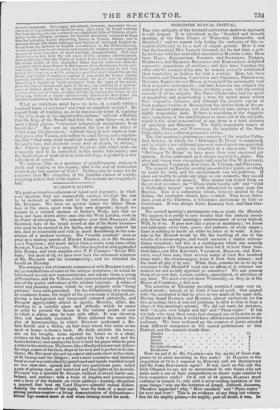DUCROW'S BENEFIT.
WE profess ourselves admirers of talent and ingenuity, in what- ever direction they are successfully exerted, whether the aim be to instruct or amuse, and be the performer Mr. BOAT or Mr. Ducaow. We have no genteel horror for Minor Thea- tres in the mass, apart from their own demerits ; though we confess to a natural shyness of Sadler's Wells, and that we have not been drawn above once into the West London, even by its Power of attraction. We remember poor little BRADLEY, the theatrical hero of the broad sword at one of the Surry houses— who used to be encored in his fights, and, struggling against his fate, died as reluctantly and with as much flourishing as the con- clusion of a modern overture. His " terrific combats" were as good as a ranting speech of HENRY KEMBLE, or as Mr. GOMER- SAL'S Napoleon ; and much better than a comic song from either SLOMAN, VALE, or WILLIAMS. We have laughed at and applauded little BURKE, and been maudlin over T. P. COOKE'S " Sweet Wil- liam ." but most of all, we have'ever been the vehement admirers of Mr. Ducaow and his horsemanship ; and we attended his benefit on Monday. The evening's entertainments commenced with DUCROWS strik- ing personifications of some of the antique sculptures ; in which he introduced several new representations, and among them, a group of Prometheus and the Vulture, which conveyed an extremely vivid idea of the poetry and nature of the sublime originals. A series of novel and pleasing scenes, which he very properly calls "living pictures," were next presented. On the withdrawing of a curtain, an enormous frame, the height of the proscenium is displayed, en- closing a background and foreground coloured pictorially, and DUCROW appropriately attired as Apollo, Mercury, Atlas, &c. standing in a suitable place and attitude, which he varies in order to present the figure in the various points of view in which a statue may be seen with effect. It was clever in idea, and tastefully executed. Then followed the usual dis- play of horsemanship, in which Ducaow performed a Ro- man Bandit and a Sailor, on that stage where this actor seems most at home—a horse's back. He fairly inhabits his horse; sits on his houghs, leans against his knees as in a chair, reclines on his back as on a sofa, makes his body a seat and his head a footstool, and employs his hoof to hold his paper while he pens a letter to his mistress. His horse, like a Houhynhym servant, follows his steps, comes at his beck, stops at his nod, and is perfect in its obe- dience. Mr. Ducaow also got up a most elaborate show in the circle, of St. George and the Dragon; and a most enormous and identical beast as ever was embodied by pasteboard and bipeds waddled round on two claw-feet, opened and shut two portentous jaws, rolled a pair of glaring eyes, and burnt red and blue lights at his nostrils. Ducaow was a splendid St. George, brilliant in sword, battle-axe, helmet, and armour; with a train of knights and pursuivants, and abevy of fair damsels on white palfreys—forming altogether a pageant that beat nip Lord Mayor's splendid annual hollow. Among the wonders of the night, were the feats of a most sur- prising posture-master—a living demonstration of dislocations-- whose legs seemed most at rest when twining round his neck.


























 Previous page
Previous page